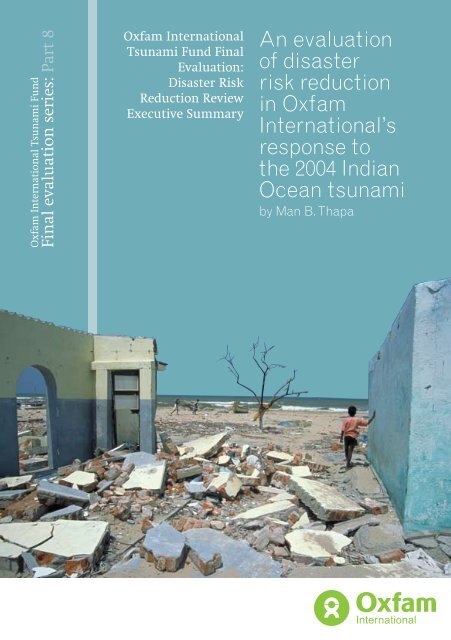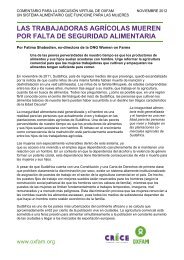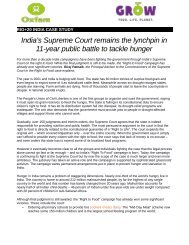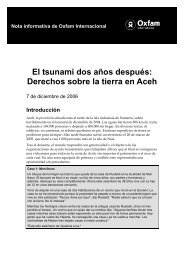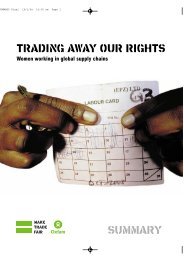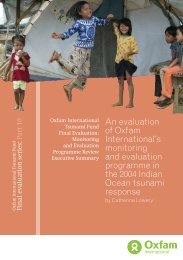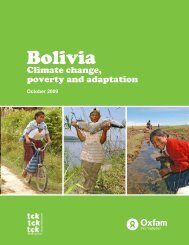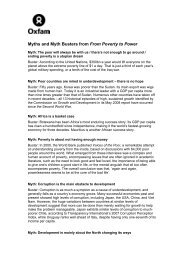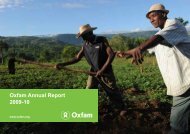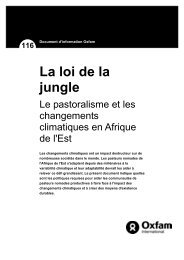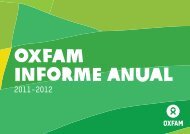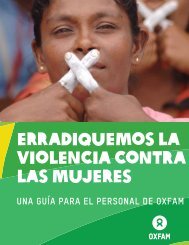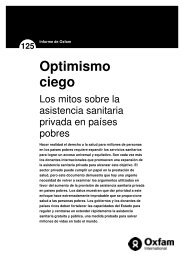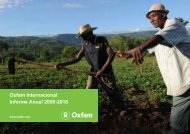Evaluation of disaster risk reduction - Oxfam International
Evaluation of disaster risk reduction - Oxfam International
Evaluation of disaster risk reduction - Oxfam International
Create successful ePaper yourself
Turn your PDF publications into a flip-book with our unique Google optimized e-Paper software.
<strong>Oxfam</strong> <strong>International</strong> Tsunami Fund<br />
Final evaluation series: Part 8<br />
<strong>Oxfam</strong> <strong>International</strong><br />
Tsunami Fund Final<br />
<strong>Evaluation</strong>:<br />
Disaster Risk<br />
Reduction Review<br />
Executive Summary<br />
An evaluation<br />
<strong>of</strong> <strong>disaster</strong><br />
<strong>risk</strong> <strong>reduction</strong><br />
in <strong>Oxfam</strong><br />
<strong>International</strong>’s<br />
response to<br />
the 2004 Indian<br />
Ocean tsunami<br />
by Man B. Thapa
Tsunami <strong>Evaluation</strong> series<br />
As part <strong>of</strong> its ongoing aims to learn from experience and to hold itself<br />
accountable for its actions, <strong>Oxfam</strong> has commissioned a wide-ranging<br />
evaluation <strong>of</strong> its response to the Indian Ocean tsunami <strong>of</strong> 2004. This<br />
comprises 14 thematic evaluations, 12 <strong>of</strong> the 14 studies have been<br />
conducted by independent consultants, while the remaining two<br />
conducted by members <strong>of</strong> <strong>Oxfam</strong> <strong>International</strong> Tsunami<br />
Fund secretariat (*)<br />
Recurring issues and key themes from the 14 individual evaluations are<br />
brought together in this evaluation summary report ’In the Wake <strong>of</strong><br />
the Tsunami’.<br />
The reports available in this series are:<br />
<strong>Evaluation</strong> summary report: ’In the Wake <strong>of</strong> the Tsunami’<br />
Thematic evaluations:<br />
1. Livelihoods Review (Rajan Alexander)<br />
2. Public Health Review (Pradeep Bharwad & Wim Klassen)<br />
3. Shelter Review (Sarbjit Singh Sahota & Dave Hodgkins)<br />
4. Gender Review (Annette Salkeld)<br />
5. Downward Accountability Review (Ravinder Kumar &<br />
N. Raghunathan, Catalyst Management Services)<br />
6. Corporate Accountability Review (John Chilver*)<br />
7. Advocacy Review (Alasdhair Collins)<br />
8. Disaster Risk Reduction Review (Man B. Thapa)<br />
9. Partners and Partnerships Review (Stuart Kenward)<br />
10. Monitoring and <strong>Evaluation</strong> Programme Review (Catherine Lowery)<br />
11. Communications Review (Alex Wynter)<br />
12. Funding and Finance Review (Clive Surman & John Chilver*)<br />
13. Management Issues Review (Simon Harris)<br />
14. OITF Architecture and Structure Review (Ge<strong>of</strong>frey Salkeld)<br />
The evaluation summary report and the executive summaries for the<br />
individual reviews can be found on the <strong>Oxfam</strong> website at<br />
www.oxfam.org/emergencies/tsunami. Full versions <strong>of</strong> the individual<br />
reviews are available on request from the <strong>Oxfam</strong> <strong>International</strong><br />
Secretariat via www.oxfam.org/contact<br />
Philip Horgan,<br />
<strong>Oxfam</strong> <strong>International</strong> Tsunami Fund Monitoring and <strong>Evaluation</strong><br />
Coordinator, December 2009<br />
Cover image: Marina Beach in Chennai was devastated by the tsunami.<br />
Credit: Rajendra Shaw/<strong>Oxfam</strong><br />
Cover note<br />
This report is one <strong>of</strong> a number <strong>of</strong> studies that make up the final<br />
evaluation <strong>of</strong> the <strong>Oxfam</strong> <strong>International</strong> Tsunami Fund’s tsunami<br />
response. <strong>Oxfam</strong> <strong>International</strong> has some concerns over the depth<br />
and breadth <strong>of</strong> the analysis in this report, and feels that the<br />
consultant may not have represented all <strong>of</strong> <strong>Oxfam</strong>’s DRR-related<br />
tsunami work due to a variety <strong>of</strong> reasons, including limited access<br />
to relevant information. This report is being published as part <strong>of</strong><br />
the series <strong>of</strong> evaluation studies, for the sake <strong>of</strong> transparency and<br />
respecting the independence <strong>of</strong> the consultant, and will be followed<br />
up in 2009 and 2010 with additional analysis by an internal <strong>Oxfam</strong><br />
DRR network.<br />
Philip Horgan, December 2009<br />
Background<br />
The Indian Ocean tsunami <strong>of</strong> December 2004 was one <strong>of</strong> the world’s<br />
worst natural <strong>disaster</strong>s, with a confirmed death toll <strong>of</strong> almost<br />
300,000. Nearly 90 per cent <strong>of</strong> deaths were in Indonesia, with Aceh<br />
province bearing the brunt <strong>of</strong> the <strong>disaster</strong>.<br />
The response <strong>of</strong> the world community was overwhelming, with<br />
huge amounts <strong>of</strong> time, resources, and logistics being donated to<br />
rescue survivors, provide food, water, and health services, clear<br />
debris, and undertake rehabilitation and reconstruction work<br />
to restore the livelihoods <strong>of</strong> the affected population. More than<br />
US$2bn worth <strong>of</strong> support was rapidly mobilised from around 40<br />
countries. About one million people in Indonesia and 700,000<br />
elsewhere had to be fed and supported over a period <strong>of</strong> many<br />
months. Providing fresh water was a priority task, as sources had<br />
been contaminated by seawater and rendered undrinkable.<br />
The <strong>Oxfam</strong> <strong>International</strong> Tsunami Fund (OITF) response was the<br />
largest single humanitarian response in <strong>Oxfam</strong>’s history, with<br />
programmes in Indonesia, Sri Lanka, India, Burma, Thailand,<br />
Somalia, and the Maldives, designed and implemented by a<br />
number <strong>of</strong> different <strong>Oxfam</strong> affiliates and with a budget totalling<br />
close to US$300m.<br />
1
Executive summary<br />
<strong>Evaluation</strong> objectives<br />
The objectives <strong>of</strong> the <strong>disaster</strong> <strong>risk</strong> <strong>reduction</strong> (DRR) evaluation<br />
were to:<br />
• Contribute to organisational learning on DRR interventions<br />
as part <strong>of</strong> <strong>Oxfam</strong>’s humanitarian response, both at the<br />
programme and policy levels, by gathering key information<br />
on DRR work done by <strong>Oxfam</strong> (either stand-alone or<br />
mainstreamed) across the tsunami response countries.<br />
• Assess the mainstreaming <strong>of</strong> DRR components into the<br />
different relief sectors upon which OI focused (shelter, water<br />
and sanitation, food security, and livelihoods) as part <strong>of</strong> its<br />
tsunami response.<br />
Observations<br />
1. In the three main response countries <strong>of</strong> India, Indonesia, and<br />
Sri Lanka, DRR activities were implemented separately, in<br />
isolation, and were not integrated with other ongoing activities<br />
such as livelihoods support, shelter, etc. There were examples<br />
where activities would have been much more effective had<br />
they been designed and implemented with the concept <strong>of</strong> DRR<br />
built in. One example was the construction <strong>of</strong> houses: in many<br />
locations, houses were constructed without raising the height<br />
<strong>of</strong> the plinth, so most <strong>of</strong> them flooded even during normal<br />
rainfall. Similarly, most livelihood activities were implemented<br />
without considering the impact <strong>of</strong> a possible future <strong>disaster</strong> in<br />
the area.<br />
3. The concept <strong>of</strong> ‘build back better’ was completely missing (as<br />
was the opinion <strong>of</strong> workshop participants, illustrated above).<br />
4. Initiatives to increase the capacity <strong>of</strong> government actors were<br />
noticeably lacking at all levels. Few training sessions on<br />
DRR were organised for actors at any level <strong>of</strong> participation<br />
e.g. community members, government authorities, etc. No<br />
assessment was carried out on the need for DRR training<br />
programmes at different levels or for different participants;<br />
there was no baseline and no clear understanding <strong>of</strong> what<br />
other actors where doing or what the gaps were. This meant<br />
that the training activities that were organised lacked a longterm<br />
impact perspective. Similarly, no significant support (e.g.<br />
policy, guidelines) was provided to government organisations<br />
to enable them to continue to scale up DRR activities.<br />
5. Except in Sri Lanka, there was no tangible or substantial<br />
support to government for the development <strong>of</strong> DRR policy,<br />
guidelines, or frameworks. In Sri Lanka, along with other<br />
actors, OI supported development <strong>of</strong> the Road Map for<br />
Disaster Management.<br />
6. OI worked on DRR largely in isolation from partner<br />
organisations, including government at all levels. In each <strong>of</strong><br />
the countries affected by the tsunami, a number <strong>of</strong> government<br />
and non-government organisations were working in the<br />
field <strong>of</strong> DRR. Reports show that OI did not have strong or<br />
visible working relationships with other organisations in India,<br />
Indonesia, or Sri Lanka. To sustain DRR-related activities<br />
and to mainstream DRR into development work in order to<br />
reduce <strong>risk</strong>s from future <strong>disaster</strong>s, all organisations must work<br />
with like-minded partners, such as the local Red Cross/Red<br />
Crescent movement, appropriate government agencies, etc.<br />
2. Even after four years <strong>of</strong> presence in the field, the various<br />
7. There was no long-term vision as to how the staff trained or<br />
activities implemented are not in a position to withstand future<br />
groups formed would be sustained in future, or how OI would<br />
<strong>disaster</strong>s or their negative impacts. This observation was<br />
liaise with them in future activities.<br />
derived from the group discussions covering Indonesia, Sri<br />
8. The DRR activities implemented by OI had no significant<br />
Lanka, and India at workshops held in Chennai and Colombo,<br />
visibility in any <strong>of</strong> the three countries studied.<br />
where none <strong>of</strong> the participants or the groups they represented<br />
were confident that the ongoing activities initiated by OI would<br />
withstand shocks from future <strong>disaster</strong>s.<br />
2 3
9. Programme reports and studies conducted to date provide<br />
no concrete suggestions on how to improve ongoing or future<br />
DRR activities or on how to mainstream DRR into<br />
such initiatives.<br />
10. The 2004 tsunami appears to have been a lost opportunity for<br />
OI in terms <strong>of</strong> building a DRR perspective into its activities.<br />
However, a consultant is still in the process <strong>of</strong> investigating<br />
what was accomplished in Aceh by OI in the field <strong>of</strong> DRR<br />
and attempting to ascertain current and long-term impacts in<br />
reducing <strong>disaster</strong> <strong>risk</strong>.<br />
Recommendations<br />
Based on the available reports, interaction with workshop<br />
participants, telephone interviews with a small number <strong>of</strong> experts,<br />
and the consultant’s personal experiences in the region, the<br />
following recommendations are proposed:<br />
1. For any future programmes in India, Indonesia, and Sri<br />
Lanka, and in any other country prone to <strong>disaster</strong> where OI is<br />
working, OI should explore possibilities to integrate DRR into<br />
all <strong>of</strong> its activities as a cross-cutting issue in order to sustain<br />
its activities.<br />
2. OI can play a significant role in assisting government at<br />
all levels to develop appropriate DRR policies and also in<br />
strengthening institutional mechanisms, capacity-building<br />
activities, and networking with like-minded organisations at all<br />
levels.<br />
3. At the country level, OI must have a strong working<br />
relationship with decentralised government agencies at<br />
all levels. In any country, local government understands<br />
what specific development challenges it faces and how<br />
to overcome such challenges. OI’s role as a development<br />
agency is to establish how and where it can fit in to manage<br />
the development gaps, rather than creating its own paradigm.<br />
Therefore, to address the real needs <strong>of</strong> any society/<br />
community, direct and indirect linkages and the building <strong>of</strong><br />
networks with local government are imperative.<br />
4. Future DRR initiatives must have significant visibility. Many<br />
DRR activities initiated by OI in its tsunami response were not<br />
visible. Similarly, OI should explore more avenues in terms <strong>of</strong><br />
working with local communities, authorities at local/community<br />
level, and administrative or government authorities at other<br />
levels, so that the activities it initiates will have visibility and<br />
can be sustained in the long term. Similarly, support for the<br />
development <strong>of</strong> policy, guidelines, and strengthening <strong>of</strong><br />
institutional mechanisms should be more visible, compared<br />
with capacity-building activities.<br />
5. OI should continue to support functional groups formed<br />
to link with government authorities at local and provincial/<br />
district levels for different activities. In developing countries,<br />
such groups can play a significant role in mobilising local<br />
communities, including community participation, linkages<br />
between communities and (I)NGOs, utilising local resources,<br />
monitoring community activities, etc.<br />
4 5
<strong>Oxfam</strong> <strong>International</strong> is a confederation <strong>of</strong> fourteen organizations working together in more<br />
than 100 countries to find lasting solutions to poverty and injustice: <strong>Oxfam</strong> America, <strong>Oxfam</strong><br />
Australia, <strong>Oxfam</strong>-in-Belgium, <strong>Oxfam</strong> Canada, <strong>Oxfam</strong> France - Agir ici, <strong>Oxfam</strong> Germany, <strong>Oxfam</strong><br />
GB, <strong>Oxfam</strong> Hong Kong, Intermón <strong>Oxfam</strong> (Spain), <strong>Oxfam</strong> Ireland, <strong>Oxfam</strong> Mexico, <strong>Oxfam</strong> New<br />
Zealand, <strong>Oxfam</strong> Novib (Netherlands), and <strong>Oxfam</strong> Québec. Please call or write to any <strong>of</strong> the<br />
agencies for further information, or visit www.oxfam.org<br />
<strong>Oxfam</strong> America: www.oxfamamerica.org<br />
<strong>Oxfam</strong> Australia: www.oxfam.org.au<br />
<strong>Oxfam</strong>-in-Belgium: www.oxfamsol.be<br />
<strong>Oxfam</strong> Canada: www.oxfam.ca<br />
<strong>Oxfam</strong> France - Agir ici: www.oxfamfrance.org<br />
<strong>Oxfam</strong> Germany: www.oxfam.de<br />
<strong>Oxfam</strong> GB: www.oxfam.org.uk<br />
<strong>Oxfam</strong> Hong Kong: www.oxfam.org.hk<br />
Intermón <strong>Oxfam</strong> (Spain): www.intermonoxfam.org<br />
<strong>Oxfam</strong> Ireland: www.oxfamireland.org<br />
<strong>Oxfam</strong> Mexico: web: www.oxfammexico.org<br />
<strong>Oxfam</strong> New Zealand: www.oxfam.org.nz<br />
<strong>Oxfam</strong> Novib (Netherlands): www.oxfamnovib.nl<br />
<strong>Oxfam</strong> Québec: www.oxfam.qc.ca<br />
<strong>Oxfam</strong> <strong>International</strong> Secretariat: Suite 20, 266 Banbury Road, Oxford, OX2 7DL, UK<br />
Tel: +44 1865 339100 Email: information@oxfaminternational.org<br />
Web site: www.oxfam.org<br />
For contact details <strong>of</strong> <strong>Oxfam</strong> <strong>International</strong> advocacy <strong>of</strong>fices, please see the website <strong>of</strong> <strong>Oxfam</strong><br />
<strong>International</strong> Secretariat, or: E-mail: advocacy@oxfaminternational.org<br />
Linked <strong>Oxfam</strong> organization.<br />
<strong>Oxfam</strong> <strong>International</strong> and Ucodep Campaign Office (Italy)<br />
Email: ucodep-oi@oxfaminternational.org<br />
<strong>Oxfam</strong> observer members<br />
The following organizations are currently observer members <strong>of</strong> <strong>Oxfam</strong> <strong>International</strong>, working<br />
towards possible full affiliation:<br />
<strong>Oxfam</strong> Japan: www.oxfam.jp<br />
<strong>Oxfam</strong> India: www.oxfamindia.org<br />
<strong>Oxfam</strong> <strong>International</strong> Tsunami Fund is a limited company number 5401107 registered in England and Wales<br />
and a registered charity number 1108700. The registered <strong>of</strong>fice is Suite 20, 266 Banbury Road, Oxford<br />
OX2 7DL, United Kingdom.<br />
<strong>International</strong>


